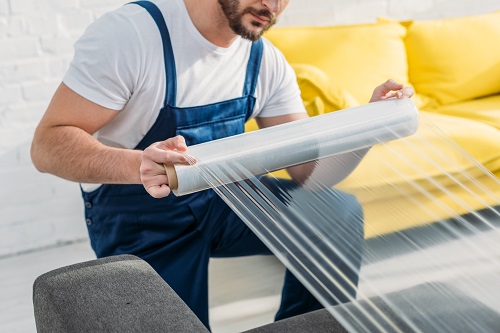
Moving can be a stressful endeavor, especially when it comes to ensuring the safety of your furniture. Don’t fret! With these invaluable tips, you’ll be able to protect your prized possessions throughout the entire moving process.
Handling furniture requires delicate care, particularly during a move. Whether you’re embarking on a cross-country journey or simply relocating down the street, the last thing you want is to discover damage to your beloved belongings upon arrival. Not to mention, furniture tends to be heavy and expensive to pack, transport, and move. The cost of replacing damaged furniture can be exorbitant.
Without proper precautions, wood furniture can be marred, upholstery can be torn, and glass can shatter. In short, moving furniture without taking protective measures can lead to complete chaos. Fortunately, our Myrtle Beach movers can transport even the most delicate furniture pieces without the fear of damage by employing a few supplies and some clever tricks.
Whether you’re looking for guidance on moving a single couch or dresser, seeking ways to protect your furniture while it’s in temporary storage, or planning to bring all your cherished pieces to your dream home, our local movers got you covered.
Furniture Moving Tips
Assemble Your Arsenal of Packing Supplies
Let’s be honest: Have you ever packed your belongings into cardboard boxes and called it a day during previous moves? Perhaps you loaded your couch, dresser, or refrigerator directly into a moving truck without protection or any form of wrapping?
It’s a common misconception that cardboard boxes, packing tape, and moving blankets are all you need to pack and safeguard your belongings. While these items can be useful, investing in a few additional supplies will ensure a flawless move to a new home or storage facility.
Which supplies do you need to protect furniture during a move? Thankfully, you don’t have to break the bank to safeguard your furniture. Simply visit your local hardware store or shop online to acquire the following additional items:
- Bubble wrap
- Plastic stretch wrap
- Sofa and mattress covers
- Sealable plastic bags
- Soft, non-scratch moving blankets
- Corrugated cardboard sheets
- Tape and a permanent marker for labeling
Prepping Your Furniture for Packing
Before you dive into packing or dismantling, here are a few things you need to do.
Take a moment to thoroughly clean and dust your furniture. It may seem trivial, but this step is crucial. Dust and debris may scratch hard surfaces when moving, and cleaning your furniture beforehand ensures you won’t bring any unnecessary grime into your new home. Trust us, you’ll thank yourself later!
Next, remove casters, knobs, and pulls from the furniture.
Take out the drawers of dressers and desks and utilize them as additional storage space while lightening a load of heavy furniture for the move.
Disassemble Furniture in Advance
Dismantle the furniture completely if possible. Remove the legs from tables and couches, disassemble your bed frame, and detach cushions from sofas and chairs.
In short, if a piece of furniture can be safely taken apart, go for it. This will make the furniture easier to move and minimize the risk of damage from brushing against walls or door frames. It will also facilitate the packing process when loading the moving truck.

Here are some tips for dismantling your furniture safely.
- Refer to the owner’s manual, if available, to ensure correct disassembly of furniture, appliances, or electronics.
- Use sealable plastic bags to store screws and other hardware for each piece of furniture. Tape the bag securely to the corresponding item to avoid misplacing any essential parts.
- If a piece of furniture has numerous components, use masking tape and a marker to indicate the placement of each piece.
- This not only protects your furniture in the long run but also saves you time and effort when it’s time to reassemble everything.
- When disassembling and reassembling, handle the drill with care to avoid stripping the screws. Adjust the torque setting and use the appropriate drill bit size for the job at hand.
- Consider dismantling furniture a day before the actual move to save time on the moving day itself. If you’ve hired professional movers, remember that time is money.
- Should you shrink-wrap your furniture for the move? Absolutely! Plastic sheeting and bubble wrap are fantastic tools that provide extra protection and are generally readily available. Plastic wrap, in particular, helps prevent scratches or gouges during the move.
Wrapping your furniture is a straightforward process that you can easily do by yourself, although having a partner can be helpful for heavier or fragile items. For delicate pieces, wrap them in two to three layers of bubble wrap or plastic sheets. Use plastic wrap or some specially made plastic covers for sofas to shield your upholstered items. Old blankets can serve the purpose.
When it comes to protecting delicate glass table tops and mirrors, don’t underestimate the power of bubble wrap. Elevate your safeguarding strategy by employing a clever technique: tape a generous “X” across the surface using painter’s tape.
This simple precaution can significantly reduce the chances of shattering if an unfortunate mishap occurs. Carefully wrap the glass or mirror, ensuring every inch is securely covered, with special attention given to the vulnerable corners.
To provide an extra layer of defence, sandwich the item between two sheets of corrugated cardboard. With these comprehensive measures in place, your precious glass furnishings will endure the journey unscathed, retaining their unparalleled allure.
When it comes to safeguarding your cherished wood furniture, a crucial decision awaits. Although plastic wrap won’t inflict harm, it may fall short of providing ample protection against potential warps, unsightly dents, and distressing cracks. Fear not, for there is a superior solution at hand.
For wooden masterpieces, it is highly recommended to use thicker materials, such as moving blankets. These stalwart guardians will envelop your furniture with unmatched resilience. Add an extra layer of protection by using plastic wrap or bubble wrap.
Moreover, don’t overlook the ingenious idea of placing corrugated cardboard sheets between the wooden layers, bestowing an additional shield against the unforeseen. With this formidable defence strategy in place, your precious wooden treasures shall endure the rigors of relocation unscathed, basking in their timeless beauty.
By following these guidelines and investing in the right supplies, you’ll significantly reduce the risk of damage to your furniture during the moving process. Take the necessary precautions and ensure that your cherished pieces arrive at your new destination unscathed, allowing you to enjoy your beautifully arranged and intact furniture in your new home.
Call now. Our team is ready to help you have a seamless, hassle-free, and enjoyable moving experience.
Like our Facebook page for more great info about moving services.
Coastal Furniture Delivery & Moving
Myrtle Beach, SC 29579
843-855-1095
http://coastalmovingmb.com
Local Areas Served: Local Movers, Long Distance Movers, Residential Movers, Movers Myrtle Beach, Myrtle Beach, Carolina Forest, Surfside Beach, Socastee, North Myrtle Beach, Little River, Longs/Loris, Conway/Aynor


No comments:
Post a Comment